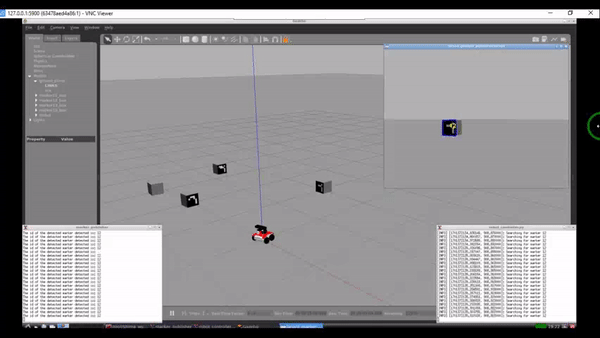-
Shima Amiri Fard, 5269794
-
Mohammadreza Koolani, 5467640
-
Mohammad Sabouri, 5659227
-
Reza Taleshi, 5029729
This project focuses on localizing, navigation and detecting four Aruco markers by a Rosbot in Gazebo simulation and with real robotm, which has a fixed camera.
The robot starts at the coordinates (0, 0), and there are four markers in the environment with IDs 11, 12, 13, and 15. The markers have the following meanings:
- Marker 11: Rotate until you find Marker 12; then reach Marker 12.
- Marker 12: Rotate until you find Marker 13; then reach Marker 13.
- Marker 13: Rotate until you find Marker 15; then reach Marker 15.
- Marker 15: Done! (Task completion marker)
Note: "Reach Marker xxx" means that one side of Marker xxx must be at least 200 pixels in the camera frame.
This project depends on few packages which are included in the whole package:
-
ArUco: The ARUCO Library has been developed by the Ava group of the Univeristy of Cordoba(Spain). It provides real-time marker based 3D pose estimation using AR markers. You can download it here (ArUco)
-
ROSbot Model: Meta package that contains all packages of Rosbot 2 an Rosbot 2R PRO inclusing rosbot_bringup, rosbot_description, rosbot_gazebo and rosbot_controller . You can download it here (ROSbot Model)
-
OpenCV: a package which contains packages to interface ROS 2 with OpenCV which is a library designed for computational efficiency and strong focus for real time computer vision applications.You can download it here (OpenCV)
This project consists of two nodes:
- Robot_controller Node: Controls robot behavior and its written in python (its in rosbot_bringup/scripts folder).
- Marker_publisher Node: Detects Aruco markers and communicates information to the robot_controller node using a custum message called Info.msg. This node is the modified version of Marker_publish.cpp from Aruco package (its in aruco_ros/src folder).
Here you can see rqt graph and figure out nodes relations:
You can find the Pseudocode of Robot_controller node:
Initialize ROS node
Define a class for RobotController:
Initialize variables for marker_list, marker_index, distance_th, misalignment_th, state, msg
Initialize ROS publishers and subscribers for '/cmd_vel' and '/info' topics
Callback function info_clbk(msg):
Set self.msg to the received message
Function search(marker_id):
Create a Twist message for robot velocity
If marker_id is equal to the current marker in marker_list:
Log detection of marker
Set angular velocity to 0
Set state to 'align'
Else:
Log searching for marker
Set angular velocity to 0.2
Publish robot velocity
Function align(marker_center):
Log misalignment adjustment
If the absolute difference between marker_center and 400 is greater than misalignment_th:
Create a Twist message for robot velocity
If marker_center is to the left of 400:
Set angular velocity to 0.1 (turn left)
Else:
Set angular velocity to -0.1 (turn right)
Publish robot velocity
Else:
Log alignment achieved
Set state to 'drive'
Function drive(marker_l):
Log moving forward
If marker_l is less than distance_th:
Create a Twist message for robot velocity
Set linear velocity to 0.2
Publish robot velocity
Else:
Log reached the desired marker
Increment marker_index
If marker_index is less than the length of marker_list:
Set state to 'search'
Log moving to the next marker
Else:
Log all markers found
Create a Twist message for robot velocity
Set linear velocity to 0
Publish robot velocity
Main loop function main_loop():
Set loop rate to 10 Hz
While not rospy.is_shutdown():
If state is 'search':
Call search function with the current marker_id
ElseIf state is 'align':
Call align function with the current marker_center
ElseIf state is 'drive':
Call drive function with the current marker_l
End If
Sleep based on the loop rate
Main:
Try:
Create an instance of RobotController
Call the main_loop function on the instance
Except rospy.ROSInterruptException:
Pass (do nothing)To download this project, you need to first clone the project:
git clone https://github.com/shimaamiri/Experimental_Assignment1.gitThen, you need to build the project in the root directory:
catkin_makeTo run the program you need to launch the package launch file which is located in the rosbot_bringup/launch folder:
roslaunch rosbot_bringup assignment.launchHere is the simulation video:
you can install the package directly on the rosbot and run the following command to run the robot drivers first, then considering that rosbot has ROS Melodic and OpenCV installed just run the two nodes.
roslaunch tutorial_pkgall.launchHere is the real robot video:
-
In the simulation in ubuntu, robot couldnt detect the marker 12 so we used to manually change robot or marker position inorder to detect it. But, with Docker robot could easily detect marker 12. Also in reality, the robot could easily detect markers. This can be accounted as one the drawbacks of ArUco. Therefore, a possible improvement can be using OpenCv functionalities rather than relying on Aruco.
-
One possible improvement can be defining a controler which control the robot speed depending on the error.
-
Instead of reaching the markers sequentially and searching for next marker, a possible improvement can be associating each marker with a certain instruction that once the robot reach each marker does a specific task.


